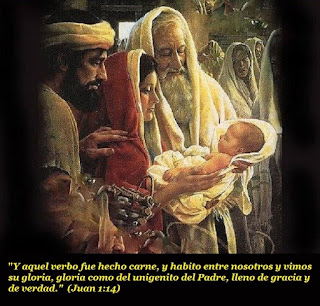“When the Lord your God cuts off from before you the nations
which you go to dispossess, and you displace them and dwell in their land, take
heed to yourself that you are not ensnared to follow them, after they are destroyed
from before you, and that you do not inquire after their gods, saying, ‘How did
these nations serve their gods? I also will do likewise.’ You
shall not worship the Lord your God in that way; for every abomination to the
Lord which He hates they have done to their gods…Whatever I command you, be
careful to observe it; you shall not add to it nor take away from it.”
Deuteronomy 12:29-32
The Christmas celebration as we know it today is clearly pagan
in origin, it has Satan's prints all over it. When researching it anyone can
see it is clearly not a Christian holiday. Many pastors and preachers know what
it is and still do nothing about it. They stand in the pulpit year after year
and do not tell the church, that it is one of the pagan's most sacred days. Why
is this? Do these pastors and preachers not know about it? The reason is the
church would not accept it and would run the pastor or preacher off! They will
let the church drown in sin at risk of losing their paycheck and position. This
is what it boils down to! It is time for God's people to stand up and
preach the truth about Christmas
IS A CHRISTIAN'S DECISION TO CELEBRATE CHRISTMAS A PART OF
CHRISTIAN LIBERTY? (Romans 14:1-13)
This passage is speaking of Jews who were observing the Old Testament
Jewish holy days/festivals and dietary laws even though they were now believers
in Christ, but they were also judging their Gentile brothers who did not
observe the Jewish customs. Likewise, the Gentile Christians were judging their
Jewish brothers who were seemingly caught up in ceremonial law. Paul was
saying, "To you, Gentile Christians leave the Jewish Christians alone,
because they are not violating any Scriptural commands by
their actions (i.e., it's a "disputable" matter and not a
moral issue). To you Jewish Christians, it's okay for you to observe the Jewish
festivals and dietary laws because they were given by God in the Old
Testament, and thereby, are considered to be previously approved worship
forms, don't judge your Gentile brothers, because there is no
Biblical command for either of you to continue to observe these things."
Paul allowed it as an act of an immature/weaker brother. If a moral
issue is involved (i.e., a practice that is covered in Scripture), then this passage
and its application to Christian liberty (i.e., the freedom to engage in
practices. by Scripture) would obviously not apply. The celebration of
Christmas appears to be such a moral issue, because its celebration is not
only, not from God, but is from ancient paganism itself!
CHRISTMAS PROVIDES A FESTIVE TIME TO SHARE THE GOSPEL
We cannot take something condemned in God's Word and use it to
spread the Gospel; neither will God bless it to spread His Word. Unacceptable
worship and the "mixing-in" of unholy/pagan forms is surely not the
normal means through which God blesses the faithful. Satan works to blend
together his system with God's system because when unacceptable worship
(paganism) is blended with true worship, true worship is destroyed. In fact,
any time we mix pagan ideas and practices into the true worship of God; it is
condemned in Scripture as the heinous sin of idolatry! God has always detested
taking those things dedicated to idols and using them to worship Him. As a
matter of fact, Christmas is probably more a hindrance to the
receptiveness of the gospel message than a help. Much of the celebration
observed by our contemporary society deludes people into assuming that God is
pleased when in reality, He is offended by false worship. The ecumenical spirit
and a counterfeit "love" under the guise of "peace and goodwill
among men," more than likely dulls one's sensitivity to his desperate need
to repent of sin and be reconciled to a holy God.
CHRISTMAS IS MERELY THE HONORING OF CHRIST'S BIRTH
Some say, "I know Christmas is of pagan origin, but I still
think it's not wrong for the church to have a special time for honoring
Christ's birth." Since when did God give the church the right to add to
the Bible? Is the church a legislative body? Are we to follow the Bible in our
faith and practice, or the thinking of fallible men? If we have the right to
add a special holy day, then we can add 10,000 other things. Then we will be no
better than the false cults and the Roman Catholics who follow heathen
traditions! Celebrating Christ's birth is a form of worship. But since
Christmas is a lie, those who celebrate it are not worshiping in
"spirit and truth" (John 4:24).
ALL I'M DOING IS PUTTING CHRIST BACK INTO CHRISTMAS
The modern conservative cry to put Christ back into Christmas is
absurd. Jesus Christ was never in Christmas. It's a lie to say He was. He has
no part in a lie. When anyone takes the truth and mixes it with a lie, they no
longer have the truth. They have changed the truth into a lie. Neither is it possible
to take a lie and mix it with enough truth to change the lie into the truth.
You still come out with a lie. You may say, "Well, I know it's not the
truth, but I'll put Christ back in Christmas and glorify God in it then."
No, you won't. Christ never was in Christmas. You cannot change a lie into the
truth. It should, in reality, be called Baal-mass, Nimrod-mass, Tammuz-mass,
Mithras-mass, or Mary-mass. Christ-mass is a lie.
I'M USING CHRISTMAS TO WITNESS FOR CHRIST, JUST LIKE THE APOSTLE
PAUL DID
Some say that all they are doing is taking the "truth"
from Christmas (i.e., the incarnation of Christ) and "cultivating" it
as the Apostle Paul did (Acts 17), taking the opportunity of the season
to witness to a lost world. This would be fine if you were actually
doing only as Paul did. Paul, in addressing the Greek philosophers on
Mars Hill, proclaimed to them that their "unknown god" to whom they
had erected an altar, was none other than "the God who made the world and
all the things therein."
But do we really use the opportunity presented by the season in
the same way as Paul used the opportunity of the pagan altar? Do you personally
stand in front of their hometown public displays of Christmas (Nativity scenes,
etc.) and preach the gospel? To paraphrase Paul, do they say: "People of
this city, I see that in every way you are very religious; what you worship as
something unknown, I am going to proclaim to you". Do they come out of the
public schools, where they have just attended their children's Christmas programs,
and preach to the attendees about the true God who has been grossly
misrepresented in the program they have just witnessed?
Most of those who understand the true origin of Christmas, this
"unique time of year" means inviting unbelievers into their homes to
gather around the Christmas tree, to enjoy the beauty of the wreaths, absorb
the heat from the Yule log, etc., reasoning that they are only using the pagan
forms and the pagan festival season as an opportunity to witness. If Paul meant
this in Acts 17, he would have met the people in the Athenian temple or in his
or their homes, gathering around their idols that he had Christianized and was
now using as a part of his worship. Most of the people who decorate their homes
and churches with Christmas trees, holly wreaths, Nativity scenes, etc.; all
supposedly to be used as "opportunities" via Christmas plays, gift
exchanges, Christmas concerts, etc., are thoroughly convinced that they're
doing God a service. Moreover, since they are not involved in the inane secular
"commercialization" that the world revels in, but have instead
"put Christ back in Christmas" (so to speak), they reason that all is
Biblical and pleasing to God.
IT DOESN'T MEAN ANYTHING TO ME
Many Christians who routinely make a habit of picking and
choosing which Biblical commands they will or will not obey have likewise
carried this practice over into a justification for celebrating Christmas. They
claim, "But the Christmas tree, mistletoe, Santa Claus, etc., don't mean
anything pagan to me, so I'll exercise my Christian liberty and partake in all
of it." Obviously, if one were to take such a casual approach to the
physical world (i.e., "I can drink rat poison because I choose not to
regard it as poison"), it would likely lead to a quick physical death.
Why, then, do Christians think they can avoid spiritual harm by ignoring God's
spiritual warnings?
THE CONNECTION HAS BEEN BROKEN
There are those who clearly recognize the pagan nature of the
various Christmas worship forms and practices. Nevertheless, many of these
Christians claim that because of the long passage of time from their pagan
inception to the present (6,000 years), the "connection" to paganism
has been sufficiently diminished to allow the adoption of these forms and
practices into our Christian worship and celebration. While it may be true that
most symbols have lost their original demonic meaning and significance in a
modern society, it is strangely bizarre and ironic that Christendom seeks to
commemorate Christ's birth with the faded symbols of Satan. Moreover, even
though some of God's people may be naive and ignorant about the source of these
things, surely God is not. Can such things please Him? And think about this; if
it were possible to "disconnect" current practices from their
pagan/occult roots, why does Scripture not provide us any guidelines as to how
much time is necessary for the "neutralization"/disassociation
process to occur; and which of the hundreds of ancient pagan rites would
then be acceptable for adaptation into Christian worship, since some are
obviously much more pagan than others?
THERE ARE HUNDREDS OF OTHER ITEMS OF DAILY LIFE THAT HAVE A
PAGAN ORIGIN
It is said, "Such things as certain clothing customs, the
modern division of time into hours and minutes, the names of the days of the
week, etc., all have pagan connections in their origins, so isn't it a
contradiction on your part to say that their meanings have
sufficiently changed while Christmas's meanings have not?" However, we are
not saying that their meanings have changed. The question is one of using
things of pagan origin in our worship of Christ. Therefore, we would ask the
question back, "Which of these pagan items do we focus on to celebrate the
birth of Christ? Or which of these is 'Christianized' and brought into our
weekly worship of, or our daily devotion to Christ, as you do with the pagan
forms and traditions of Christmas?" The origin and meaning of a custom,
tradition, or form does not take on significance unless it is somehow specifically
incorporated into our worship. These things are merely
the byproducts of paganism, not paganism itself, and they
have developed no religious connotations or associations of their own, as the
Christmas customs and traditions have.
ABSTAIN FROM THE OBSERVANCE OF CHRISTMAS
What, then, ought to be the church's response to this and other
pagan and Roman inventions? It cannot be denied that they are pagan, from
beginning to end. God gives us specific instructions in His Holy Word: Thus
saith the Lord, Learn not the way of the heathen ... (Jer. 10:2).
These words are perfectly clear. What rational options do we have as
Bible-believing Christians?







